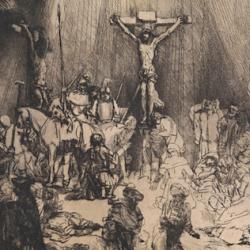In his Atonement: A Guide for the Perplexed, Adam Johnson calls the doctrine of the Trinity the “foundation” of the doctrine of the atonement. The atonement only makes sense in the light of a richly Trinitarian theology proper. Johnson shows how the Trinity is necessary both to explain the coherence of the atonement and to rebut critiques of atonement.
He argues, for instance, that the question “Why the God-Man?” isn’t answered by referring to the nature of sin, since “there are other ways that sin could be dealt with.” Rather, “the necessity lies in the divine will itself. To be clear, this necessity does not force God into an undesired path; rather, it is the necessity of relentlessly self-giving divine love, the necessity of the delight God takes in the most fitting or appropriate way to fulfill his creative purposes: sharing the divine life with the creature.” And the necessity of relentless divine love is the necessity of God’s own Triune being (66).
The Trinity also enables us to respond to the criticism that the atonement is a form of divine child abuse. Many of these critiques, often from feminist theologians, rest on “an account of God bordering on, if not fully embracing, a tritheistic interpretation of the Father, Son and Holy Spirit as distinct entities or personalities, in which the Father relates to the Son in a violent and abusive manner” (69).
But the Triune God is one, with one will in which “there is no struggle, no difference of will within the Godhead, as if the Father wills one thing, and the Son wills another” (71). Johnson rightly emphasizes that “this does not mean . . . that God wills everything he wills monolithically, in the same way – for he wills what he wills in the oneness of the Father, Son and Holy Spirit.” In short “God wills the passion of Christ triunely,” such that “the one God willed the suffering, death and resurrection of Jesus Christ” (71).
This means that “the one God willed to send himself by means of a threefold willing: as Father he willed to sacrifice; as Son he willed to be sacrified; and as Spirit he willed to accompany and enable the sacrifice” (72). When the Father sends the Son, He doesn’t “hold himself back but gives himself fully in giving the Son. . . . In coming to us, the incarnate Son does not leave behind the Father, but is the mode of the Father’s presence with us. In the death of Christ the Father is not hidden, for his death is the revelation of the Father – the Father who suffers in the suffering of the Son” (73). Thus, “critiques of the atonement as intra-divine abuse fall radically short of the threefold self-involvement of the one God of the Gospel” (73).
The Trinity also essential to understanding how God could “take our sin up into his own life, and deal with it as God by means of the relationships proper to his own being and life. The bearing of and doing away with our sin is thus a thoroughly Trinitarian event,” so much so that “were it not for God’s triunity, such an event would be impossible – for it is God’s freedom to relate to himself as himself by means of himself that enables him to bring sin into his own life. Were God monolithic, a single God, he would not be free to relate to himself in this way” (82). The voice is the voice of Hegel and Balthasar, but the force of this is deeply rooted in the gospel account of the atonement, which is as thoroughly Trinitarian, albeit less abstract. Here as elsewhere it’s important to heed Johnson’s warning about marginalizing the resurrection: Trinitarian atonement is fulfilled when the Father raises the Son by the Spirit.
I had reservations about to Johnson’s chapter on “the atoning life of Jesus.” He appeals, rightly, to the Irenaean concept of recapitulation, arguing that “the history of Adam and Eve, Israel and indeed all of humanity is repeated and yet transformed in the course of the life of Christ.” He cites the temptation of Jesus, a reversal of the temptation of the first Adam (129). True and important; but can we really account for the atonement without talking about the specifics of Jesus’ ministry of healing, exorcism, teaching, assembling a new Israel? Shouldn’t the specifics of Jesus’ life (and death) be part of our theology of atonement?















